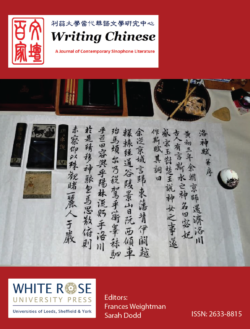Writing Chinese: A Journal of Contemporary Sinophone Writing - Editorial
We're very excited to share the editorial from the very first issue of our journal, Writing Chinese: A Journal of Contemporary Sinophone Writing! We hope you'll read the whole issue online, and we'd like to thank all our contributors, and of course White Rose University Press. As the journal has a rolling deadline we'll be using this blog to keep you up to date on new content, and please keep an eye on our social media too!
***
Inaugural Issue: Editors' Note
 We are delighted to launch the inaugural issue of Writing Chinese: A Journal of Contemporary Sinophone Literature. The Journal is based within The Leeds Centre for New Chinese Writing, in the University of Leeds, UK. A research hub with a strong public engagement programme, our Centre was formally established in 2018. It grew out of an AHRC-funded project entitled “Writing Chinese: Authors, Authority and Authorship” which aimed to engage practitioners (authors, translators, publishers) and academics working on, or embodying, concepts of authorship in a Chinese-language setting.
We are delighted to launch the inaugural issue of Writing Chinese: A Journal of Contemporary Sinophone Literature. The Journal is based within The Leeds Centre for New Chinese Writing, in the University of Leeds, UK. A research hub with a strong public engagement programme, our Centre was formally established in 2018. It grew out of an AHRC-funded project entitled “Writing Chinese: Authors, Authority and Authorship” which aimed to engage practitioners (authors, translators, publishers) and academics working on, or embodying, concepts of authorship in a Chinese-language setting.
In our Centre we interpret ‘Chinese’ in its widest possible sense. Terminology is always a minefield, and there is never a perfect English term to encapsulate the richness of the range of literature we aim to include. In essence, we are happy to include work on any literature whose author identifies it as Chinese, whether by location, theme, language or ethnicity, and we see part of our role as providing an inclusive space to raise questions, and listen, rather than prescribing definitive boundaries.
This objective, to bring people together and facilitate dialogue across diverse disciplines, career stages, languages, professional affiliations and perspectives, is also core to our Journal’s mission.
We encourage research articles from both established and emerging scholars. We have a stringent double-blind peer-review process for all research articles, but within this offer an academic mentoring option to early career scholars, available after articles have passed the review stage and been accepted in principle for publication. The degree of peer review is not diminished, but we hope this allows for a supportive pathway through what can otherwise be a daunting process, and that the notorious “reviewer 2” caricature can be avoided.
Alongside the latest English-language research, we will also publish new translations of influential or innovative works of contemporary Chinese-language scholarship, with a view to expanding access to these studies, and opening up more space for dialogue across language boundaries. The texts will normally be selected via recommendation by members of our Advisory Board. Translations (unless otherwise stated) are provided by our Centre’s Academic Translation Team, composed mainly of affiliated PGR researchers and headed by Dr Zhang Wenqian.
Academia does not, and cannot, operate in a vacuum. Throughout our Centre’s history, events, seminars and roundtables which span the boundaries of theory and practice have often proved truly inspirational. Academic research on themes, interpretations and analytical approaches to literary works cannot be divorced from the creative processes which produce these works, and the consumers who read them. For us this communication circuit includes authors, translators, editors, illustrators, publishers, booksellers, school teachers, readers and reviewers. In each of our journal issues, we include a features section, dedicated to exploring these practices.
Our inaugural keynote authors Bonnie McDougall and Xi Chuan have both bridged the academic/practitioner divide and are excellent examples of how the worlds of academia, translation and authorship can enrich one another. It is a privilege to publish pieces from such eminent scholars, which are simultaneously personal and profound. We are equally delighted to be publishing research articles from Duncan Poupard (CUHK, Hong Kong) on minority literature and Martina Codeluppi on climate fiction (University of Insubria, Italy). Finally, this issue also sees the launch of our feature on transnational dialogues, our first interview focussing on Chinese children’s literature, with a lively discussion between Chinese academic Zhao Xia and London-based translator Helen Wang. For this issue the Academic Translation Team has consisted of Zhang Wenqian, Qiao Peng, Peter Goff and Li Wenxi.
While we are very pleased to be able to present such a strong body of work all together for our inaugural offering, our Journal has a rolling deadline. Future content will therefore be highlighted and publicised in the editorial thread of our Centre blog, which is on-going (https://writingchinese.leeds.ac.uk/blog/).
We are hugely grateful to our Journal Advisory Board for providing both strategic oversight and practical support for this endeavour. Finally, with so many competing constraints in academic life, we are particularly aware of the added burden peer review can be, and would like to note how appreciative we are to all of our peer reviewers for their time, their insightful comments, their enthusiasm and collegial generosity.
- Frances Weightman and Sarah Dodd
